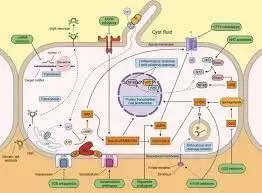- Home
- Medical news & Guidelines
- Anesthesiology
- Cardiology and CTVS
- Critical Care
- Dentistry
- Dermatology
- Diabetes and Endocrinology
- ENT
- Gastroenterology
- Medicine
- Nephrology
- Neurology
- Obstretics-Gynaecology
- Oncology
- Ophthalmology
- Orthopaedics
- Pediatrics-Neonatology
- Psychiatry
- Pulmonology
- Radiology
- Surgery
- Urology
- Laboratory Medicine
- Diet
- Nursing
- Paramedical
- Physiotherapy
- Health news
- Fact Check
- Bone Health Fact Check
- Brain Health Fact Check
- Cancer Related Fact Check
- Child Care Fact Check
- Dental and oral health fact check
- Diabetes and metabolic health fact check
- Diet and Nutrition Fact Check
- Eye and ENT Care Fact Check
- Fitness fact check
- Gut health fact check
- Heart health fact check
- Kidney health fact check
- Medical education fact check
- Men's health fact check
- Respiratory fact check
- Skin and hair care fact check
- Vaccine and Immunization fact check
- Women's health fact check
- AYUSH
- State News
- Andaman and Nicobar Islands
- Andhra Pradesh
- Arunachal Pradesh
- Assam
- Bihar
- Chandigarh
- Chattisgarh
- Dadra and Nagar Haveli
- Daman and Diu
- Delhi
- Goa
- Gujarat
- Haryana
- Himachal Pradesh
- Jammu & Kashmir
- Jharkhand
- Karnataka
- Kerala
- Ladakh
- Lakshadweep
- Madhya Pradesh
- Maharashtra
- Manipur
- Meghalaya
- Mizoram
- Nagaland
- Odisha
- Puducherry
- Punjab
- Rajasthan
- Sikkim
- Tamil Nadu
- Telangana
- Tripura
- Uttar Pradesh
- Uttrakhand
- West Bengal
- Medical Education
- Industry
Dietary intervention and metformin fail to change Tubular biomarkers in patients with polycystic kidney disease: Study

Dietary intervention and metformin fail to change Tubular biomarkers in patients with polycystic kidney disease suggests a study published in the BMC Nephrology.
Tubular biomarkers, which reflect tubular dysfunction or injury, are associated with incident chronic kidney disease and kidney function decline. Several tubular biomarkers have also been implicated in the progression of autosomal dominant polycystic kidney disease (ADPKD). We evaluated changes in multiple tubular biomarkers in four groups of patients with ADPKD who participated in one of two clinical trials (metformin therapy and diet-induced weight loss), based on evidence suggesting that such interventions could reduce tubule injury. 66 participants (26 M/40 F) with ADPKD and an estimated glomerular filtration rate (eGFR) ≥ 30 ml/min/1.73m2 who participated in either a metformin clinical trial (n = 22 metformin; n = 23 placebo) or dietary weight loss study (n = 10 daily caloric restriction [DCR]; n = 11 intermittent fasting [IMF]) were included in assessments of urinary tubular biomarkers (kidney injury molecule-1 [KIM-1], fatty-acid binding protein [FABP], interleukin-18 [IL-18], monocyte chemoattractant protein-1 [MCP-1], neutrophil gelatinase-associated lipocalin [NGAL], clusterin, and human cartilage glycoprotein-40 [YKL-40]; normalized to urine creatinine), at baseline and 12 months.
The association of baseline tubular biomarkers with both baseline and change in height-adjusted total kidney volume (HtTKV; percent change from baseline to 12 months) and estimated glomerular filtration rate (eGFR; absolute change at 12 months vs. baseline), with covariate adjustment, was also assessed using multiple linear regression. Results: Mean ± s.d. age was 48 ± 8 years, eGFR was 71 ± 16 ml/min/1.73m2, and baseline BMI was 30.5 ± 5.9 kg/m2. None of the tubular biomarkers changed with any intervention as compared to placebo. Additionally, baseline tubular biomarkers were not associated with either baseline or change in eGFR or HtTKV over 12 months, after adjustments for demographics, group assignment, and clinical characteristics. Tubular biomarkers did not change with dietary-induced weight loss or metformin, nor did they associate with kidney disease progression, in this cohort of patients with ADPKD.
Reference:
Wang, W., You, Z., Steele, C.N. et al. Changes in tubular biomarkers with dietary intervention and metformin in patients with autosomal dominant polycystic kidney disease: a post-hoc analysis of two clinical trials. BMC Nephrol 25, 206 (2024). https://doi.org/10.1186/s12882-024-03643-6
Dr. Shravani Dali has completed her BDS from Pravara institute of medical sciences, loni. Following which she extensively worked in the healthcare sector for 2+ years. She has been actively involved in writing blogs in field of health and wellness. Currently she is pursuing her Masters of public health-health administration from Tata institute of social sciences. She can be contacted at editorial@medicaldialogues.in.
Dr Kamal Kant Kohli-MBBS, DTCD- a chest specialist with more than 30 years of practice and a flair for writing clinical articles, Dr Kamal Kant Kohli joined Medical Dialogues as a Chief Editor of Medical News. Besides writing articles, as an editor, he proofreads and verifies all the medical content published on Medical Dialogues including those coming from journals, studies,medical conferences,guidelines etc. Email: drkohli@medicaldialogues.in. Contact no. 011-43720751


